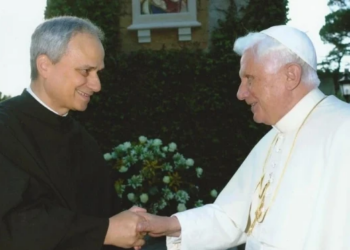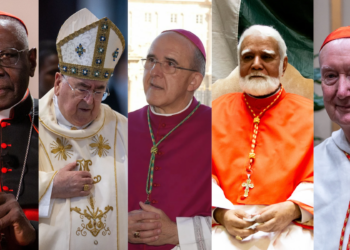HL Mencken once observed that: “Democracy is the theory that the common people know what they want, and deserve to get it good and hard.”
One is put in mind of it by the latest polling from More in Common which shows that the return of Boris Johnson as leader would apparently springboard the Conservatives back into the lead. Only call our Arthur back from beneath Avalon and Reform UK would drop six points, whilst the Tory share would rise by five.
Such results are testament to the sheer extent to which politics can boil down to vibes over content. Johnson is despised by many liberals, and beloved by many right-wing Conservatives, despite the actual substance of his programme – tripling net immigration, new taxes on sugar, and more public spending – pointing in completely the opposite direction.
Yet how much comfort should the Tory Party actually draw from these findings?
Not much, I suggest. The repeatedly-proven ability to walk away remarkably unwounded from any plane you crash might be a great comfort to a pilot. It is not obviously any comfort to their passengers.
Consider the Boriswave. Now, it might well be the case that, as Tom Harwood points out, this remains for now a term known only to the very online. But less important than whether voters blame Johnson personally for completely inverting the promise of the Brexit vote is whether they blame the Conservatives for it, and they clearly do.
Nor does he seem to have any answers. His most recent piece for the Daily Mail is essentially an undiluted shot of the usual comforting memes the Party likes to tell itself. On the economy, for example:
“I think there is a real chance of a tipping point. I mean a 1979 moment, when the public decide with a great roar that they have had enough of Labour tax and spend, and the unions, and wokery in general, because they can see the damage it is doing.”
Should this window of political opportunity arrive – and it has not yet, which is why ‘Labour tax and spend’ is not so very different from the Tory tax-and-spend under the previous government – what would he do with it? He doesn’t say. Margaret Thatcher embarked on a radical programme of spending restraint and was for a while extremely unpopular. That doesn’t seem likely.
How would he deal with the threat of Reform? Even if More in Common’s ‘Boris bounce’ materialised in full, Nigel Farage’s party would still be on 23 per cent of the vote. It has just eviscerated the Tories’ most reliable infantry corps across a swath of councils, and is teeing up to do the same next year. Well, let’s see:
“I don’t think the public will hand power to the newish third party (the one that was on zero when I was PM – what was it again, they keep changing the name: Refund? Relaunch? Regurgitate?) and history teaches us that such ventures – no matter how temporarily exciting – do not last long in UK politics.”
Compelling stuff.
Finally, what about immigration? We are talking, after all, about the man who secured a landslide on the basis of getting Brexit done and then used the new points-based system to take net migration to three quarters of a million people per year. Priti Patel wants to be thanked for this, but Johnson is a politician of a different calibre so perhaps he has a better response:
“There is only one party that will invest in the skills of people in this country rather than go for what is now obviously Starmer’s solution to our skills shortage – to return to the fool’s gold of uncontrolled mass immigration from the EU.”
All right then. Amusingly, in slightly djinn-like fashion, the rest of the paragraph makes no mention of the Conservatives being the party that would do anything about immigration. Johnson wishes to imply it, but apparently not quite so shameless as to actually promise it:
“There is only one party that will be willing and able to cut taxes, sack quangocrats and boost growth and productivity by dropping the crazed doctrinaire Miliband approach to climate change and offering consumers and industry what they really need – the cheapest electricity in the Western world.”
(Meanwhile the opening sentence of this sketched nirvana – “There is only one party that can get back to levelling up the whole country, rather than concreting over the South East.” – is code for doing nothing about the housing crisis.)
Perhaps there is yet a section of the parliamentary Conservative Party for whom this would do. The MPs’ hierarchy of needs scales logarithmically, after all, with ‘retaining my own seat’ orders of magnitude more important than everything else.
But the most important thing to remember about polling is that the public is not obliged to hold views which add up to a coherent programme for government, nor to remember what it said it wanted when it doesn’t like the consequences. If the measures that would fix this country were popular, they would already have been undertaken.
For all that, it seems unlikely that Johnson will actually manage to return to frontline politics (if even he wants to, rather than merely cultivating the flattering myth of himself as prince over the water). It would only be possible if a sitting Conservative leader decided to allow him to go forwards as a Tory candidate – and any who did would do so in the explicit knowledge that he would steal their job.


![Pentagon Begins Booting Trans Troops After Supreme Court Greenlights Ban [WATCH]](https://www.right2024.com/wp-content/uploads/2025/05/Pentagon-Begins-Booting-Trans-Troops-After-Supreme-Court-Greenlights-Ban-350x250.jpg)
![Trump Posts Hilarious Pope Meme, Leftists Immediately Melt Down [WATCH]](https://www.right2024.com/wp-content/uploads/2025/05/Trump-Posts-Hilarious-Pope-Meme-Leftists-Immediately-Melt-Down-WATCH-350x250.jpg)













